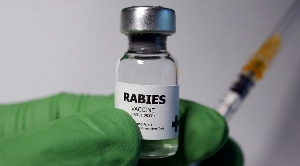By: Emmanuel Amoah
So far this year, 26 people have lost their lives to rabies out of 31 reported cases across nine regions in Ghana.
The Greater Accra Region recorded the highest number of fatalities, with six deaths. Both the Central and North East regions followed closely, each reporting four deaths. In the Western Region, three lives were lost, while the Western North and Upper West regions reported two deaths each. The Eastern, Ashanti, and Upper East regions recorded one death each.
Dr. Emmanuel Allegye-Cudjoe, Chief Veterinary Officer at the Veterinary Department, revealed these statistics during the launch of World Rabies Day (WBD) in Accra last Thursday. The event, themed “Breaking Rabies Boundaries,” aimed to raise awareness about rabies, a disease that continues to be a global public health threat. Annually, it is estimated to cause over 55,000 human deaths worldwide, with 56% of those deaths occurring in Africa.
Dr. Allegye-Cudjoe expressed concern over the rising number of stray and unvaccinated dogs, particularly in major cities like Accra and Kumasi, where many rabies cases are reported.
“In 2016, the number of human deaths from rabies rose to 57 from 25, recorded between 2009 and 2011. From 2020 to 2023, 793 suspected cases of human rabies were reported, leading to 77 deaths. By the end of 2023, 331 suspected cases were recorded, with Greater Accra accounting for 112 of those cases,” he explained.
He emphasized that rabies is preventable through vaccination, yet poor public knowledge and the negligence of some pet owners who fail to vaccinate or properly care for their animals are contributing to the rising cases.
Ahead of the official WBD event on September 28, the Veterinary Department and its partners have launched a free or low-cost vaccination campaign for pets and are increasing public awareness through various media outlets.
“The government has secured over one million doses of rabies vaccines for this year’s campaign. Meanwhile, experts are advocating for the revision of the Animal Act under the Animal Health Bill 2020, which will enhance rabies control and improve animal management practices in the country,” Dr. Allegye-Cudjoe stated.
He urged the public to maintain clean environments and report animal bites immediately to veterinary facilities. He also encouraged pet owners to ensure their dogs receive regular vaccinations.
Dr. Benjamin Sasu, Risk Communications Officer for the Veterinary Services Department, announced that this year’s World Rabies Day campaign would extend over six months to cover the entire country due to the increase in rabies cases.
“Our main objective is to eradicate rabies in Ghana, especially among children, who are the most vulnerable to dog bites and scratches. We plan to conduct awareness campaigns in all regions, which will include free pet vaccinations, educational outreach in schools, social media campaigns, and public events like floats and marches,” Dr. Sasu noted.
David Youngs, Communications Officer at the Food and Agriculture Organisation (FAO), highlighted the need for urgent action to control zoonotic diseases, which increasingly affect humans through animals and the environment.







